

Webmaster
Drumbeat 16th May

King Brothers - Drumbeat
16th May:
Taking part:
| Bob Miller & the Millermen: | Orchestra Director and Orchestra |
| John Barry: | Group Leader |
| John Barry Seven: | Instrumental Group |
| The Three Barry Sisters: | Vocal Group |
| The Kingpins: | Vocal Group |
| Vince Eager: | Vocalist |
| Sylvia Sands: | Vocalist |
| Adam Faith: | Vocalist |
| Roy Young: | Vocalist/Pianist |
| The King Brothers: | Vocal Group |
| Lonnie Donegan & Group: | Vocalist & Group |
| Trevor Peacock: | Compere |
Music played 'live':
| John Barry Seven: | Long John |
| Adam Faith & JB7: | Come on Baby |
| Kingpins, Millermen: | Flip Flop & Fly |
| Vince Eager & Millermen | Beach Party |
| Roy Young & JB7 | Do What You Did |
| Millermen: | Walkin’ To Mothers |
| Barry Sisters & JB7 | I-Ay ove-lay Oo-Yay |
| King Brothers & Millermen | Hop Skip & Jump |
| John Barry Seven: | Toots* |
| Sylvia Sands, Barry Sisters & Millermen: | Heartaches at Sweet Sixteen |
| Vince Eager & JB7: | Don’t Knock on My Door |
| Barry Sisters, Kingpins, Millermen: | Come Softly To Me |
| Millermen: | South Rampart Street Parade |
| Adam Faith & JB7 | Please Don’t Touch |
| Lonnie Donegan & Group: | Fort Worth Jail |
| Roy Young & JB7: | Ooh My Soul |
| Vince Eager & Company: | Rockin’ the Joint |
| 1. | 4th April | 12. | 20th June |
|---|---|---|---|
| 2. | 11th April | 13. | 27th June |
| 3. | 18th April | 14. | 4th July |
| 4. | 25th April | 15. | 11th July |
| 5. | 2nd May | 16. | 18th July (Telerecorded) |
| 6. | 9th May | 17. | 25th July |
| 7. | 16th May | 18. | 1st August |
| 8. | 23rd May | 19. | 8th August |
| 9. | 30th May | 20. | 15th August |
| 10. | 6 June | 21. | 22nd August |
| 11. | 13th June | 22. | 29th August |
| John Barry – The Lost Tracks | |||
| Related External Links to artists' websites | |||
Drumbeat 9th May
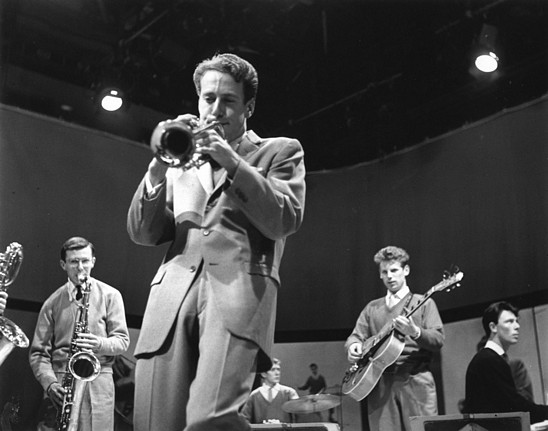
John Barry on Drumbeat
9th May:
Taking part:
| Bob Miller and the Millermen | Orchestra Director and Orchestra |
| John Barry | Group Leader |
| John Barry Seven | Instrumental Group |
| The Lana Sisters | Vocal Group |
| The Raindrops | Vocal Group |
| Vince Eager | Vocalist |
| Sylvia Sands | Vocalist |
| Adam Faith | Vocalist |
| Terry Dene | Vocalist |
| Cliff Richard & The Drifters | Vocalist |
| Roy Young | Vocalist/Pianist |
| Sheila Buxton | Vocalist |
| Gus Goodwin | Compere |
| Paul Maguire | Audience Supervisor |
Music played 'live':
| Vince Eager & John Barry Seven: | Rip It Up |
| Adam Faith & John Barry Seven: | Say Mama |
| Lana Sisters & Millermen: | Tell Him No |
| Cliff Richard & The Drifters: | Down The Line |
| The Millermen: | Cat Walk |
| Roy Young & John Barry Seven: | Jenny Jenny |
| Raindrops & Millermen: | Italian Style |
| John Barry Seven: | Roulette |
| Sylvia Sands & Millermen: | Easy |
| Terry Dene & John Barry Seven: | It's Late |
| Millermen: | Compulsion |
| Vince Eager & Millermen: | Brand New Cadillac |
| Adam Faith & John Barry Seven: | You Break Me Up |
| John Barry Seven: | Little John |
| Sheila Buxton & Millermen: | You Do Something To Me |
| Cliff Richard & The Drifters: | Mean Streak |
| Vince Eager & Company: | Shake It Lucy Baby |
| 1. | 4th April | 12. | 20th June |
|---|---|---|---|
| 2. | 11th April | 13. | 27th June |
| 3. | 18th April | 14. | 4th July |
| 4. | 25th April | 15. | 11th July |
| 5. | 2nd May | 16. | 18th July (Telerecorded) |
| 6. | 9th May | 17. | 25th July |
| 7. | 16th May | 18. | 1st August |
| 8. | 23rd May | 19. | 8th August |
| 9. | 30th May | 20. | 15th August |
| 10. | 6 June | 21. | 22nd August |
| 11. | 13th June | 22. | 29th August |
| John Barry – The Lost Tracks | |||
| Related External Links to artists' websites | |||
Drumbeat 2nd May
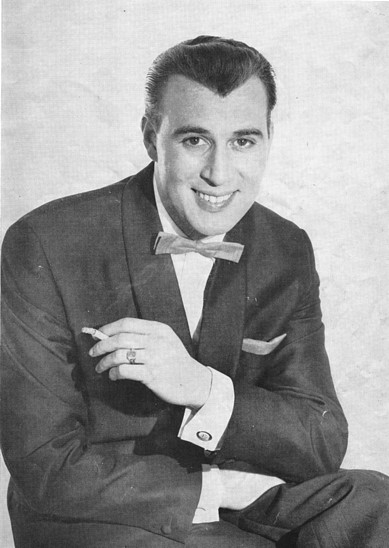
John Barry on the Drumbeat set with The Three Barry Sisters.
2nd May:
Taking Part:
| Bob Miller and the Millermen | Orchestra Director and Orchestra |
| John Barry | Group Leader |
| John Barry Seven | Instrumental Group |
| The Lana Sisters | Vocal Group |
| The Raindrops | Vocal Group |
| Vince Eager | Vocalist |
| Sylvia Sands | Vocalist |
| Adam Faith | Vocalist |
| Billy Fury | Vocalist |
| Charlie Drake | Vocalist |
| Roy Young | Vocalist/Pianist |
| Malcolm Vaughan | Vocalist |
| Gus Goodwin | Compere |
| Paul Maguire | Audience Supervisor |
Music played 'live':
| Vince Eager & JB7: | Blue Suede Shoes |
| Roy Young & JB7: | Long Tall Sally |
| Raindrops & Millermen: | Hey Miss Fannie |
| Millermen: | Rockin’ Sandy |
| Adam Faith & JB7: | Believe What You Say |
| Lana Sisters & Millermen: | Rock ‘n roll is here to stay |
| John Barry Seven: | Trollin’ |
| Sylvia Sands & JB7: | You’re The One |
| Vince Eager & Millermen: | This Should Go On Forever |
| Millermen: | Fireball |
| Adam Faith & JB7: | I ain’t givin’ up nothing |
| Malcolm Vaughan, Raindrops, Millermen: | Wait For Me |
| Billy Fury, Raindrops, Millermen: | Mean Woman Blues |
| John Barry Seven: | Tequila |
| Charlie Drake, Raindrops, Millermen: | Sea Cruise |
| Roy Young & JB7: | Love Is All |
| Vince Eager & Company: | Wonderful Time Up There |
| 1. | 4th April | 12. | 20th June |
|---|---|---|---|
| 2. | 11th April | 13. | 27th June |
| 3. | 18th April | 14. | 4th July |
| 4. | 25th April | 15. | 11th July |
| 5. | 2nd May | 16. | 18th July (Telerecorded) |
| 6. | 9th May | 17. | 25th July |
| 7. | 16th May | 18. | 1st August |
| 8. | 23rd May | 19. | 8th August |
| 9. | 30th May | 20. | 15th August |
| 10. | 6 June | 21. | 22nd August |
| 11. | 13th June | 22. | 29th August |
| John Barry – The Lost Tracks | |||
| Related External Links to artists' websites | |||
Drumbeat 25th April
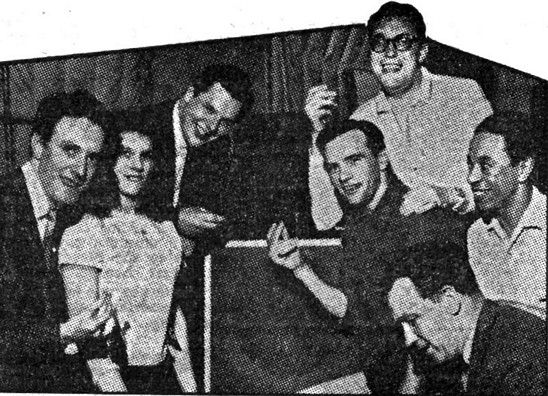
The recording of the Drumbeat album at Abbey Road Studios.
Pictured, from the left, are: John Barry, Sylvia Sands, Stewart Morris, Dennis Lotis,
Norman Newell, Bob Miller, Geoff Love.
25th April:
Taking part:
| Orchestra Director: | Bob Miller |
| Orchestra: | The Millermen |
| Group Leader: | John Barry |
| Instrumental Group: | The John Barry Seven |
| Vocal Group: | The Three Lana Sisters |
| Vocal Group: | The Raindrops |
| Vocal Group: | The Mudlarks |
| Vocalist: | Vince Eager |
| Vocalist/Pianist: | Roy Young |
| Vocalist: | Sylvia Sands |
| Vocalist | Adam Faith |
| Vocalist | Terry Dene |
| Guest Vocalist: | Anthony Newley |
| Compere: | Gus Goodwin |
Music played 'live':
| Vince Eager & JB7: | Ready Teddy |
| Lana Sisters & Millermen: | Buzzin |
| Adam Faith & JB7: | Never Mind |
| Millermen: | Robot Walk |
| Roy Young & JB7: | Where were you on our wedding day? |
| Raindrops & Millermen: | Charlie Brown |
| John Barry Seven: | Farrago |
| Sylvia Sands, Millermen: | Love me in the daytime |
| Terry Dene & JB7: | I need your love tonight |
| Vince Eager, Raindrops, Millermen: | Never Be Anyone Else But You |
| Millermen: | Peter Gunn |
| Roy Young & JB7: | I Go Ape |
| Anthony Newley, Raindrops, Millermen: | Idle On Parade |
| John Barry Seven: | Bees Knees |
| Mudlarks & Millermen: | Tell Him No |
| Adam Faith & JB7: | I Vibrate |
| Vince Eager & Company: | Open Up Dem Pearly Gates |
| 1. | 4th April | 12. | 20th June |
|---|---|---|---|
| 2. | 11th April | 13. | 27th June |
| 3. | 18th April | 14. | 4th July |
| 4. | 25th April | 15. | 11th July |
| 5. | 2nd May | 16. | 18th July (Telerecorded) |
| 6. | 9th May | 17. | 25th July |
| 7. | 16th May | 18. | 1st August |
| 8. | 23rd May | 19. | 8th August |
| 9. | 30th May | 20. | 15th August |
| 10. | 6 June | 21. | 22nd August |
| 11. | 13th June | 22. | 29th August |
| John Barry – The Lost Tracks | |||
| Related External Links to artists' websites | |||
Drumbeat 18th April
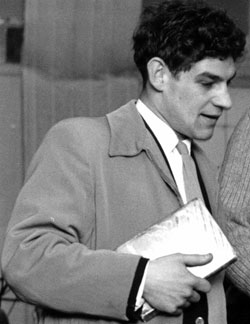
|
Trevor Peacock & John Barry - Drumbeat
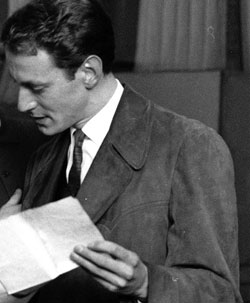
|
18th April:
Taking Part:
| Bob Miller and the Millermen | Orchestra Director and Orchestra |
| John Barry | Group Leader |
| John Barry Seven | Instrumental Group |
| The Three Barry Sisters | Vocal Group |
| The Kingpins | Vocal Group |
| Vince Eager | Vocalist |
| Sylvia Sands | Vocalist |
| Adam Faith | Vocalist |
| Billy Fury | Vocalist |
| Lita Rosa | Vocalist |
| Roy Young | Vocalist/Pianist |
| Gus Goodwin | Compere |
Music played ‘live’:
| Adam Faith & The JB7: | Big Blon’ Baby |
| Barry Sisters & JB7: | Tall Paul |
| Vince Eager & Millermen: | Lovin’ Up A Storm |
| Millermen: | Gone Train |
| Roy Young & The JB7: | She Said Yeah |
| John Barry Seven: | Rebel Rouser |
| Billy Fury, Barry Sisters, Millermen: | Mighty, Mighty Man |
| Sylvia Sands, Kingpins & JB7: | Fallin’ |
| Kingpins & Millermen: | Don’t Leave Me |
| Vince Eager, Kingpins, Millermen: | Donna |
| Adam Faith, Kingpins, JB7: | Diamond Ring |
| Millermen: | Whitewash |
| Barry Sisters, Kingpins, Millermen: | I’ve Had It |
| John Barry Seven: | Long John |
| Lita Roza & JB7: | Once in a While |
| Roy Young & JB7: | Slippin’ and Slidin’ |
| Vince Eager, Millermen, JB7 & Company: | I Need Your Love |
| 1. | 4th April | 12. | 20th June |
|---|---|---|---|
| 2. | 11th April | 13. | 27th June |
| 3. | 18th April | 14. | 4th July |
| 4. | 25th April | 15. | 11th July |
| 5. | 2nd May | 16. | 18th July (Telerecorded) |
| 6. | 9th May | 17. | 25th July |
| 7. | 16th May | 18. | 1st August |
| 8. | 23rd May | 19. | 8th August |
| 9. | 30th May | 20. | 15th August |
| 10. | 6 June | 21. | 22nd August |
| 11. | 13th June | 22. | 29th August |
| John Barry – The Lost Tracks | |||
| Related External Links to artists' websites | |||
Drumbeat 11th April
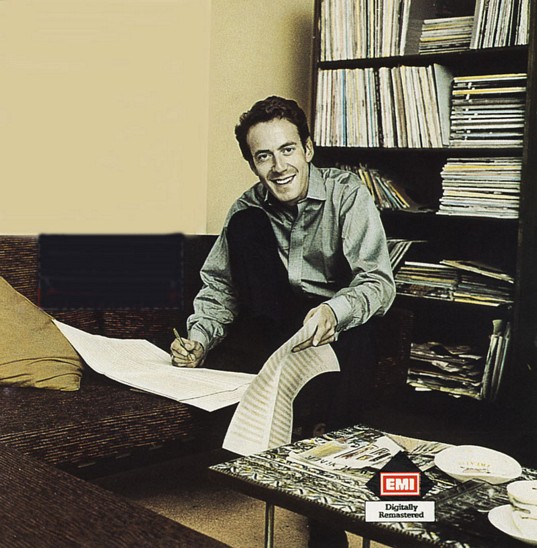
John Barry with score - Drumbeat
11th April:
Taking part:
| Orchestra Director: | Bob Miller |
| Orchestra: | The Millermen |
| Group Leader: | John Barry |
| Instrumental Group: | The John Barry Seven |
| Vocal Group: | The Three Barry Sisters |
| Vocal Group: | The Kingpins |
| Vocalist: | Vince Eager |
| Vocalist/Pianist: | Roy Young |
| Vocalists: | Sylvia Sands |
| Adam Faith | |
| Billy Fury | |
| Petula Clark | |
| Ronnie Carroll | |
| Compere: | Gus Goodwin |
Music played ‘live’:
| The John Barry Seven: | Bees Knees |
| Vince Eager & The JB7: | Hard Headed Woman |
| Millermen & Kingpins: | Shame on You Miss Johnson |
| Millermen: | Beatnik |
| Roy Young & The JB7: | By the light of the Silvery Moon |
| The John Barry Seven: | Mad Mab |
| Adam Faith & The JB7: | Once More |
| Millermen, Kingpins, Sylvia Sands: | Pink Shoe Laces |
| Millermen, Kingpins, Ronnie Carroll: | Tomboy |
| Vince Eager & The JB7: | It Doesn’t Matter Anymore |
| The Barry Sisters & Millermen: | May You Always |
| Millermen: | Midnighter |
| Billy Fury, Barry Sisters & JB7: | Maybe Tomorrow |
| Millermen, Kingpins, Barry Sisters: | I Had a Dream Dear Rock |
| The John Barry Seven: | Long John |
| Petula Clark & Millermen: | Suddenly |
| Adam Faith & The JB7: | Say Mama |
| Vince Eager, Millermen, JB7 & Comp.: | Stagger Lee |
| 1. | 4th April | 12. | 20th June |
|---|---|---|---|
| 2. | 11th April | 13. | 27th June |
| 3. | 18th April | 14. | 4th July |
| 4. | 25th April | 15. | 11th July |
| 5. | 2nd May | 16. | 18th July (Telerecorded) |
| 6. | 9th May | 17. | 25th July |
| 7. | 16th May | 18. | 1st August |
| 8. | 23rd May | 19. | 8th August |
| 9. | 30th May | 20. | 15th August |
| 10. | 6 June | 21. | 22nd August |
| 11. | 13th June | 22. | 29th August |
| John Barry – The Lost Tracks | |||
| Related External Links to artists' websites | |||
Drumbeat 4th April
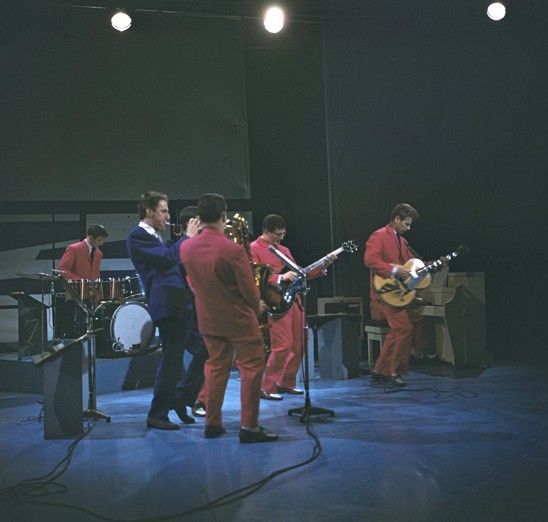
4th April:
Taking part:
| Bob Miller: | Orchestra Director |
| The Millermen: | Orchestra |
| Instrumental Group: | The John Barry Seven |
| Vocal Group: | The Three Barry Sisters |
| Vocal Group: | The Kingpins |
| Vocalist: | Vince Eager |
| Vocalist: | Sylvia Sands |
| Vocalist: | Adam Faith |
| Compere: | Gus Goodwin |
| Vocalist: | Dennis Lotis |
Music played ‘live’:
| The John Barry Seven: | Bees Knees |
| Vince Eager & The JB7: | Dixieland Rock |
| The Barry Sisters & The JB7: | Tall Paul |
| Bob Miller & The Millermen: | Cat Walk |
| Roy Young & The JB7: | I Go Ape |
| Millermen, Kingpins, Sylvia Sands: | I’m In Love |
| The John Barry Seven: | Long John |
| Adam Faith & The JB7: | I Vibrate |
| Millermen, Kingpins, Dennis Lotis: | Moonlight Serenade |
| Millermen & Kingpins: | Charlie Brown |
| Millermen: | Night Hop |
| Adam Faith & The JB7: | C’mon Everybody |
| Millermen & Barry Sisters: | Early To Bed |
| Vince Eager, Kingpins & The JB7: | It’s Late |
| The John Barry Seven: | When The Saints Go Marching In |
| Millermen, Kingpins, Barry Sisters: | I’ve Had It |
| John Barry Seven & Russ Conway: | Side Saddle |
| Millermen, JB7 & Company: | There’s Good Rockin’ Tonight |
| JB7 & Millermen: | Jumping with Symphony Sid |
n.b. Russ Conway was not included in the credits!
| 1. | 4th April | 12. | 20th June |
|---|---|---|---|
| 2. | 11th April | 13. | 27th June |
| 3. | 18th April | 14. | 4th July |
| 4. | 25th April | 15. | 11th July |
| 5. | 2nd May | 16. | 18th July (Telerecorded) |
| 6. | 9th May | 17. | 25th July |
| 7. | 16th May | 18. | 1st August |
| 8. | 23rd May | 19. | 8th August |
| 9. | 30th May | 20. | 15th August |
| 10. | 6 June | 21. | 22nd August |
| 11. | 13th June | 22. | 29th August |
| John Barry – The Lost Tracks | |||
| Related External Links to artists' websites | |||
Drumbeat to be released on CD
May 16, 2010
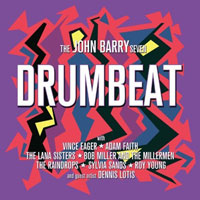 Music from the 1959 BBC pop series that launched a host of stars including Adam Faith, Dusty Springfield, Jackie (White Horses) Lee, Vince Hill, songwriter Les (It’s Not Unusual) Reed and British film composer John Barry, best known for scoring 11 James Bond films.
Music from the 1959 BBC pop series that launched a host of stars including Adam Faith, Dusty Springfield, Jackie (White Horses) Lee, Vince Hill, songwriter Les (It’s Not Unusual) Reed and British film composer John Barry, best known for scoring 11 James Bond films.
Also featuring: Vince Eager, The Lana Sisters, Bob Miller and The Millermen, The Raindrops, Sylvia Sands, Roy Young and Dennis Lotis.
http://www.silvascreenmusic.com and other (online) shops.
Reviews:
Why the new Bonds never struck a chord with John Barry
Why the new Bonds never struck a chord with John Barry
- CHRIS GOODMAN
24 September 2006
The Express on Sunday
(c) Copyright Express Newspapers 2006
Composer John Barry reminisces about the part he played in the swinging Sixties and tells CHRIS GOODMAN why he has little faith in the modern 007.
At his impressive house in Cadogan Square, Chelsea, 72-year-old John Barry still cuts a hip figure. "Stand straight," barks his American wife, Laurie, as her husband, some 20 years her senior, poses for our photographer with an easy air. Barry intermittently yells four-letter expletives at her while appearing charm personified to everyone else in the room.
Laurie glowers, half out of pride, half with anger, and Barry glances schoolboy looks at her to check that he has got away with his language.
The huge tapestry on one wall seems to waver, then settle as they flash smiles between each other. Older now, perhaps wiser, this is Barry's fourth and most successful marriage, 28 years strong.
Barry, one of Britain's finest composers and certainly its most iconic movie composer, was the archetypal Sixties swinger. It cost him three marriages but established his professional credentials.
When he married 19-year-old model and actress Jane Birkin in 1965, a Newsweek article dubbed him the man "with the E-type Jag and the E-type wife".
Barry is in London to prepare for a special concert at the Royal Albert Hall on September 28. He recently produced an album for the Ten Tenors, an Australian crossover opera troupe who recorded some of his finest film compositions. Barry will conduct two of the most famous - We Have All The Time In The World and Goldfinger - two classics from the period when he composed 12 scores for James Bond films.
Despite guiding Adam Faith's early career, composing soundtracks for Out Of Africa and Dances With Wolves and having five Oscars to his name, Barry will be forever linked with Bond. It was his scores that gave Bond its action, tension and glamour, inventing a Cold War identity for a Britain stripped of its empire and languishing behind the USA and the Soviet Union.
Tellingly, as the Bond franchise prepares to kick into gear for Daniel Craig's debut in the upcoming Casino Royale, he has little faith in the modern 007. "I haven't been a fan of Bond for a long time,” he says in a soft Yorkshire brogue.
"I gave up after The Living Daylights in 1987. I'd exhausted all my ideas, rung all the changes possible. It was a formula that had run its course. The best had been done as far as I was concerned."
Barry identifies co-producer Harry Saltzman's sale of his share of the franchise to United Artists in 1975 as the turning point. "There used to be one solid school of people.
When that broke down, I didn't know who was running the show any more. That's why, when you see them on television, you don't say: 'Oh no, it's an old Bond, 'you say: 'Wow, it's an old Bond, that's great.' "You see one of the newer films is on and you think: 'Forget it, I'll watch something else.'" He's still friends with Barbara Broccoli, current Bond producer and daughter of original Bond co-producer Cubby, but Barry will not be rushing out to see the new film.
Barry sees Bond soundtracks as a clumsy excuse to advertise pop songs, inserted into the action with little thought. As a result, he does not even visit cinemas any more, let alone work on soundtracks. "I see a film on television and I don't know where these people are coming from,” he says. "When this guy sat down to write this, what the hell was he thinking about?
"We very carefully planned these films. Everything was intertwined. The sound effects weren't running all over the music or vice versa. It was orchestrated in the real sense of the word. Now there doesn't seem to be a plan and it doesn't just go for music, it goes for the screenwriter and art director.
It's a different world - but I don't want to sound like an old fart."
Monty Norman penned The James Bond Theme but it was Barry who orchestrated the piece to such effect. From the second film, Goldfinger, Barry became the sole composer, writing the scores and the songs.
Barry maintains that he was brought in when Norman and Saltzman fell out, admitting to his own problems with the difficult producer.
Saltzman had told Barry that Goldfinger, sung by Shirley Bassey, was one of the worst songs he'd ever heard before it became a massive international hit. The song only made it into the film because it was too late to take it out.
One of Barry's fondest memories of the swinging Sixties is a lunch at his favourite haunt, the Pickwick Club. Barry's tenant, Michael Caine, was there with his girlfriend Edina Ronay, along with Terence Stamp and Jean Shrimpton.
"Goldfinger had just become a hit and Saltzman walks in and says hello to Michael and then turns to me and says, 'Thank you, John.'
"Terry Stamp shot up and shouted, 'You f****** a*******.' It was so theatrical, everyone was on the floor and Harry just continued walking out the door. I remember everything about that moment of triumph."
He remembers other moments less well - like his marriages. "My daughter from my first marriage to Barbara [Pickard] came by the other day and showed me some old photos.
I said, 'Who's that?' She said, 'It's Barb,' her mother. It sounds awful but I really couldn't remember what she looked like then."
This amnesia extends to the reasons for his marriage break-ups, perhaps even the reasons why he married. "I can't remember those kind of things, "he claims, "the emotional significance. I recall London then, going to see my friends in Denmark Street every day, the music, the coffee bars. I love my family life now but a little part of me would go back to all that in a second!"
He has four children; the youngest, Jon Patrick, is just 11.
The success of Bond in the Sixties, Barry argues, was a result of everyone working at the top of their game in a special period. It is difficult to imagine that anyone involved in Casino Royale will have such a unique set of influences to draw on as did Barry. Maybe the golden age of 007 really is over.
The interview is. "All right, I'm coming!" Barry shouts, as his wife announces that they are late for lunch.
A Chat with The Composer - John Barry
A Chat with The Composer
BY ARTHUR KNIGHT
ca. April 1972
LONDON - The lights dimmed in the fashionable Leicester Square Odeon, and from behind the glowing orange stage curtains came a blast of thumping, amorphous sound that purported to be music. Soon it was joined by a thin, childlike voice that kept singing, "Curiouser and curiouser" . . . and some other words that got lost between the forced volume (obviously based on someone's notion that more is better) and the inadequacy of the theatre’s sound system to reproduce in the higher registers.
All this was the prelude to a midnight screening of excerpts from a forthcoming, multistarred production of Alice's Adventures In Wonderland, due here around Christmas. For a preview, as well as a glimpse of the actual shooting, American National, which opens the U.S. and Canadian rights to Alice, flew to London a planeload of about eighty prospective exhibitors, some sixty press and TV people, and perhaps thirty-five of its own key executives. The screening was intended to be the highlight of the trip.
Unfortunately, as was soon apparent, it was anything but. To be sure, one could recognize in the excerpts such luminaries as Sir Ralph Richardson as the Caterpillar, Peter Seller's as the March hare, Sir Robert Helpmann as the Mad Hatter, and, if one looked very closely beneath the make-up, Michael Crawford as the White Rabbit. The excerpts, however, were studded with printed slugs reading "Scene Missing," the editing was still rough, the colour and the sound unbalanced. The underscoring, so important to a film of this sort, had yet to be written and many in the audience stated that they found the songs themselves uninspired.
As it happened, I had purposely sought out John Barry, Alice's composer, during my visit to the rambling Shepperton studio the day before, mainly because his was one of the few behind-the-camera names with which I was familiar. Also, I have consistently admired his work, from the rock variations of The Knack to the medieval classicism of The Lion In Winter, and from the pungent guitar concerto that accompanied Boom! to the blaring, driving rhythms of the James Bond pictures. I was curious to discover the kind of man who composed so effectively in so many different idioms.
There is probably no more endearing introduction to an artist than a display of familiarity with his work. In any case, before the afternoon was over, Barry - a lean, tall fellow who looks at least a decade younger than his thirty-nine years - had auditioned the entire score for me on the superb stereo system installed in his sleek white Citroen '72. "Actually," he said, half-apologetically, "the sound here is far better than the studio's sound system, and the tracks for my cartridges are properly mixed, while the film tracks won't be finally mixed until September."
I found John Barry's music for Alice - all twenty-one numbers - utterly charming, ingeniously orchestrated, and wholly different from any of his scores that I was familiar with. For one thing, it was more tender, more romantic, much in the spirit of Prokofiev's nostalgic modernisms in the Romeo and Juliet or Cinderella ballets, although interspersed were Elgaresque fanfares, and a hilarious patter song between Sellers and Helpmann that owed more to the Twenties' music halls than to Gilbert and Sullivan. Somehow, Barry had managed to make an orchestra that never numbered more than fifty sound like twice that many. And the lyrics by Don Black - often witty, sometimes poetic - always seemed to ride effortlessly just above the surface of their accompaniment.
Next day, over a kipper mousse at Burke's Club, Barry somewhat diffidently began to talk about composing for films. Although he had a classical education in music, his entrance into the film field was through association with a rock group, the John Barry Seven, and a period as accompanist to a rock singer named Adam Faith (who seems to have been the British Elvis Presley). When Faith went into the movies, Barry went with him. The duo did not remain together very long. "We had different ideas about music," said Barry, succinctly.
"I've come to look on music as a voice, an attitude, that exists outside the film itself," he continued. "If the music is saying the very same thing as the pictures, then obviously it is being redundant. If you begin to notice the music as an intrusion, then it is bad. But if you become aware of the music emotionally and are responding to it along with the film itself, then it is a good score. I feel that the film composer should be, first, a good dramatist, and, second, a good composer. He should be able to expand, through his music, what the film is saying, not merely repeat or underline it."
Barry rejects emphatically the notion that movie music should be bland or neutral, or simply-as Aaron Copland once put it - "a small lamp placed beneath the screen to warm it." According to Barry, "If music doesn't sing, or dance, or have an interesting harmonic concept, then it shouldn't be there at all. A film score should burn with its own fire, not merely glow in the dark like a pretty charcoal." When he reads a new script, it is with an eye to what he can add to it - and also to what he is not going to do with it. "Choice is taste," is virtually his maxim, and it applies equally to his choice of scripts and his choice of the musical forms to accompany them.
What concerns him most is the quality (or lack of quality) in most theatre speaker systems. Barry became extra conscious of this at an early age, because his father was an exhibitor. "It's absolutely pointless to go for hi-fi sound in films when you know how it's going to sound for most audiences," he said. "When I record a score, I go for the highest quality that the studio can give me. But then I bring in standard speakers and re-record for these. Actually, it's a recording calculated to bring out the best in your average theatre installations." By all odds, he admitted, the sound on his numerous LPs and tapes was better than anything one might hear in the theatre, or, for that matter, in the Royal Albert Hall, where the Royal Philharmonic will perform an all-John Barry program on October 7 (including excerpts from his score for Goldfinger, which he calls "Mickey Mouse Wagner").
I looked around for John Barry at the Leicester Square Odeon on that last night in London, but failed to spot him. I hope he wasn't there. What with the curtains that muffled his sound, the unbalanced tracks, and the Odeon's tubby speakers, he would probably have been tearing great handfuls out of his long, but already thinning hair.
Contact the JB site
If you wish to send an email, for example with content for the website, please:
Send us a message through Facebook
Location
Bristol, UK
Geoff (owner) and Ruud (webmaster) have been running the John Barry website since June 18, 2001. This website is not endorsed by the composer's family. Use of copyrighted materials and logos are for promotional purposes only. All files on this website are for personal use only and cannot be bought or sold.
Please do not ask for permission to use John Barry music or photographs for your project -- it is not within our gift to grant this.
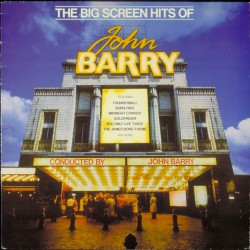
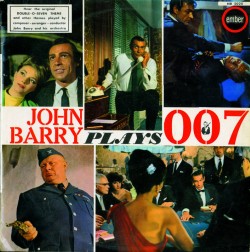
Our other sites
Geoff Leonard writes CD booklet notes, articles, and occasionally books, in partnership with Pete Walker. You can read more about this here:
Some albums
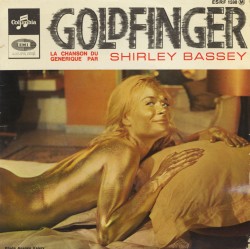
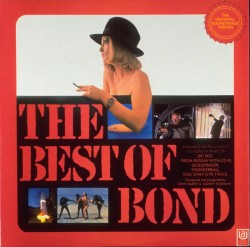
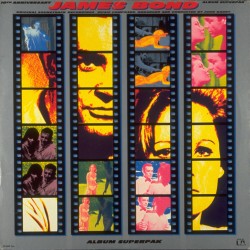
Events or Concerts
Submit your Event or Concert, This email address is being protected from spambots. You need JavaScript enabled to view it. We will not be responsible for any errors or inaccuracies.




